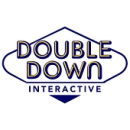In many video games, players often assume the role of a leader.
Whether it’s the commander of vast armies, a humble hero thrust into the role of savior or a silent farmer looking to revitalize a small village, the medium often imbues characters with good leadership qualities — regardless of who they are.
Game developer DoubleDown Interactive abides by similar principles at the office and beyond. Taking a page from the stories and worlds of its industry, the company offers employees the chance to take on the role of manager, even for individual contributors.
Take Ian Smith, for example. The manager of game design started as an independent mobile developer on the team, and eventually made their way up to become the leader of their department.
“The thing that’s kept me at this company is a culture that encouraged me to explore and expand my skill set rather than seeing employees as static office equipment fulfilling a role,” Smith said.
As with most leadership roles, the leap from IC to department manager didn’t come without challenges and adaptations. The key is having people along the way — like non-player characters in a game — who foster their growth and learning. A long, supported journey of trial and error allows team members like Smith to develop their own leadership style and cadence.
In time, DoubleDown’s culture of empowerment creates a leader who passes on their own distinct insight into what it means to be an effective manager. To hear their advice and get a glimpse into their journey, Built In Seattle sat down with Smith for a chat on what having an employer that invests in their career trajectory is like.
Describe your growth journey from individual contributor to manager.
I have been with DoubleDown for almost 10 years. In that time, I have been able to transition from mobile developer to game producer to game designer, before becoming the manager of the game design department — my goal the whole time. Every manager I have worked for has been genuinely supportive of my growth, and now I strive to do the same for the designers I manage.
What is the biggest challenge of transitioning into management, and how are you overcoming that challenge?
The biggest challenge for me is learning when to push back with critique when one of my game designers takes a fundamentally different approach to a design than I would have. Game design is a subjective discipline, and I often know how I would approach a given problem. But there are usually many possible routes to a number of different answers. Finding the line between, “That’s not how I would do it, but it’s a sound choice” and “I don’t think this is the right path to pursue for this design” is a struggle that I am still mastering.
I want to give my game designers constructive critique, and that means coaching them to be the best versions of themselves, not teaching them how to design like me. It’s an exercise in humility and open-mindedness that I will always be trying to refine.
What advice do you have for individual contributors who have recently been promoted to a management role or hope to be in the future?
Practice empathy. You need to understand others to be an effective leader. If you manage everyone in the same way you like to be managed, you are not going to be getting the best out of your reports.
It’s an exercise in humility and open-mindedness that I will always be trying to define.”
Regardless of the discipline or the role, we’re all people who exist in a much larger context than the workplace. So respect the individual, put effort into understanding them and treat them as a whole human being. That’s just life advice really, but you definitely get extra mileage out of it as a manager.







